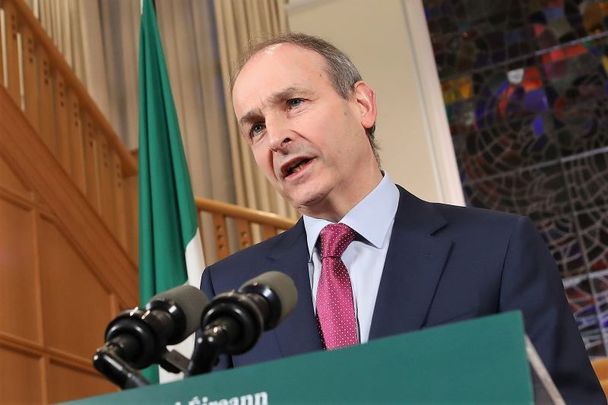The current Level 5 restrictions in the Republic of Ireland have been extended through April 5, with some adjustments, Taoiseach Micheál Martin confirmed in a live address this evening.
In a live televised address on Tuesday evening, Taoiseach Micheál Martin acknowledged that people are "physically and emotionally exhausted" and thanked them for their efforts in helping "drive down the levels of infection."
Noting the emergence of the so-called UK, or B-117 variant, the Taoiseach said the country is in a very different place from where it was just a few months ago.
He continued: “Today, the government has published our updated plan for managing our way through the pandemic, the path ahead.
“Essentially, to open up our country safely, we need to keep the numbers of new infections low and accelerate the vaccination programme in line with improving the supply."
The Taoiseach confirmed that Ireland will remain in Level 5 restrictions between now and April 5, but noted that "there will be three very important differences between the coming six weeks and the Level 5 period we’ve just been through."
The three important differences include the phased reopening of schools from March 1, the expanded reopening of childcare from March 8, and resuming non-COVID health and social care services in the coming weeks.
“In advance of the fifth of April, we will review the situation,” the Taoiseach said, adding that “it is critically important that we do not let our guard down.”
He went on to say: "When we open things, we want them to stay open. That is why I cannot over-emphasize the importance of continued observance of Level 5 restrictions. It is why if you are currently working from home, you must continue to do so.
In order to move into less restrictive phases, three areas will be considered: community transmission of the virus, hospital and ICU occupancy, and the vaccine programme.
The Taoiseach said: "Our commitment is to deliver as fast and as comprehensive a vaccination programme as possible. So far, our only limit has been supply.
“We’re making steady progress. Over 350,000 vaccine doses have already been administered. We are now in a position to implement a major ramping-up of the programme."
Calling the country’s vaccination programme “unprecedented,” the Taoiseach said: “By the end of March, we will have administered 1.25 million doses. Then, depending on vaccines arriving as scheduled, we will administer on average more than 1 million doses per month during April, May, and June.
"What that means in practical terms is that by the end of April, up to 40 percent of people over 18 years of age will have had their first dose. By the end of May, up to 64 percent will have had their first dose. And by the end of June, up to 82 percent of adults who can be vaccinated will have received at least one dose, and 55 percent to 60 percent will be fully vaccinated.”
You can watch the Taoiseach entire address from this evening here:
The Irish government has since published its updated COVID-19 Resilience and Recovery 2021 - The Path Ahead:
Schools and childcare
- March 1:
- Special schools at 100% capacity
- Junior and senior infants, 1st and 2nd class to return to school
- Final year Leaving Certificate classes to return to school subject to final agreement
- March 8:
- Resumption of the ECCE programme and return to school of ECCE-age children
- March 15:
- 3rd, 4th, 5th and 6th class at primary level
- 5th year post-primary students to return to school
- March 29:
- Early learning and care, and school-age childcare services to reopen
- April 12:
- 1st to 4th years post-primary return to school
Economic Measures
The following payments have been extended to June 30, 2021:
- Pandemic Unemployment Payment
- Employment Wage Subsidy Scheme
- COVID-19 Enhanced Illness Benefit
- Covid Restrictions Support Scheme
- Suspension of redundancy provisions
- Commercial rates waiver
The Irish government, acknowledging the impact of the ongoing restrictions, also said that an "an additional €10 million in funding will be made available to meet the increase for mental health services, and a further top-up of €10 million will be made available to enable critical services to continue being delivered to vulnerable groups."
The government added: "The decision to extend Level 5 restrictions is difficult and will have considerable impact on all parts of our economy and society. However, we continue to have an unacceptably high level of disease in the community, so we must continue to suppress the disease. The higher transmissibility of new variants requires all other restrictions to remain in place while these initial services reopen.
If the transmission of the virus reaches acceptable levels, the vaccination programme progresses as planned and public health advice allows, further options that will be considered from 5 April are:
- some easing of restrictions on outdoor activities and meetings beyond 1 other household
- consideration of extending the current 5km limit
- staggered start of easing of other areas of restriction with a focus on outdoor activities including sport and some areas of construction
Any further easing of restrictions after 5 April will need a further three to four week period to allow for assessment of the impact of changes
The requirement to work from home will continue throughout this period, unless work is an essential health, social care, or other essential service or activity that cannot be done from home.
The government’s community support and well-being programmes will continue and employment and business supports will be extended, many of them to June.
The government is committed to developing a clear roadmap for a return of activities in the hardest-hit sectors including tourism, culture, and sport.




Comments